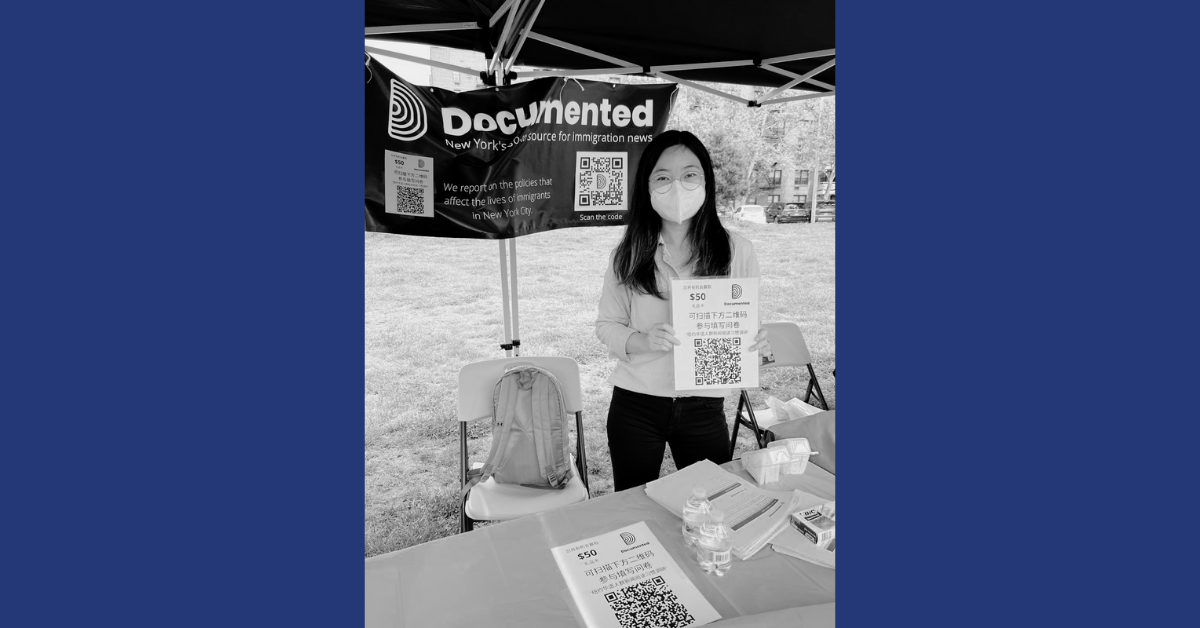When Documented’s Chinese Community Correspondent April Xu joined the team last year, she told me in an interview that there’s a gap between the Chinese community in New York and mainstream society — some misunderstanding, stereotyping or myth between them.
April has lived in New York for almost 10 years, and she has enjoyed telling stories about New York’s Chinese immigrant community because that way mainstream society can get a better understanding of them, she said.
In the past ten months, April conducted in-depth surveys and interviews with 946 participants in New York to identify gaps in media coverage as Documented prepared to launch a Chinese news vertical. The goal was to better understand how to cover the community’s concerns. Below, April shares some behind-the-scenes insights about the report Documented recently published. We spoke about how Documented conducted a Chinese survey in New York with an adequate sample size and more.
Fisayo Okare: Prior to joining Documented, you were working for Sing Tao Daily in New York and already familiar with the Chinese community here. What did your research further reveal to you about the knowledge you have gathered after nearly a decade of covering this community in the city?
April Xu: The survey provided a deeper understanding of how anti-Asian hate crimes, a longstanding issue in the U.S., affects Chinese immigrants. There’s a long history of discrimination against minority groups in the U.S., including anti-Asian hate that goes as far back as the 19th century. Before the pandemic, we heard of some Chinese immigrants getting discriminated against because of their country of origin but that was not too common in terms of news coverage.
Many Chinese immigrants said prior to the pandemic they were either less unaware of the discrimination they faced due to their ethnicity or were unfamiliar with the media coverage of such incidents. But the pandemic began and it really amplified the existing issues. It made them worried and scared. In the second round of the survey, 30 Chinese immigrants were interviewed, with some sharing personal experiences of hate crimes, while others encountered it for the first time during the pandemic. Public safety emerged as the top issue of concern for the majority of participants.
What surprised you the most during the research?
I didn’t expect a large percentage of participants to be housewives (21%) and retirees (16%). When I was reporting about Chinese community issues, I didn’t run into too many housewives. But while distributing the surveys at Documented, I did. I think the reasons are because they are more sensitive to the incentives —because we sent gift cards to some of the participants to encourage them to participate in our survey. I asked many community organizations to help us to distribute the questionnaires. I think those housewives also have more time or are more available to attend community events hosted by those organizations.
The second thing that surprised me is the feedback from the participants: 77% of them expressed dissatisfaction with the portrayal of the Chinese community in the news. So when I told them “Hey, I’m here to interview you and listen to your input about the current coverage about the Chinese community,” many were happy to be interviewed as they felt that the media rarely engaged with them.
How did you get to know or identify her?
In the second round, we focused on interviewing seniors after noticing their prevalence in the initial survey. I contacted senior centers in the Chinese community for in-depth interviews. On that day, they had a community event in the building, so they said I could see if there are seniors willing to talk to me.
What was the most difficult part of the research process?
The survey targeted Chinese immigrants in New York City, particularly in Queens, Brooklyn, and Manhattan because the preliminary report we made with the Listening Post Collective and the available data showed that Chinese immigrants are particularly in those three boroughs. Despite the team’s effort to reach out to as many Chinese immigrants as possible, it was challenging due to low literacy and limited manpower. To distribute the questionnaires, the team used digital channels like WeChat and community organizations, but some participants were hesitant due to concerns about scams. In-person meetings at community events helped build trust and encourage participation. However, some groups, including undocumented immigrants and young people, were difficult to reach. Undocumented immigrants are hard to identify, and young people between 18 to 25 were less interested in participating.
83% of Chinese immigrants in the report recommend English-language media to better reflect their lives and community. What would they like to see?
Chinese immigrants feel that English-language media rarely covers news relevant to their community, except when something bad happens, and they are often left out of daily news. They are civically engaged and have opinions on education reform, public safety, bail reform, and homelessness, but they feel English media outlets don’t interview or represent them. They want English media to provide helpful information and cover community events to improve their daily lives and promote a positive image. Chinese immigrants who are not fluent in English rely on Chinese-language media but sometimes question their objectivity. So they are like “Okay, if an English media outlet is more objective, can you also produce something in Chinese?” That’s a bit harder for all media outlets to achieve.
Your research also looked at other opportunities for potential media products to target Chinese immigrants in the city. What are some of those?
Chinese immigrants in NYC need high-quality, unbiased, accurate, and consistent reporting on topics they care about through WeChat to be better engaged. Our research found that 89% of Chinese immigrants want more objective media, while 56% said there is a lack of follow-up stories, and 44% said audience engagement needs to improve. Public safety, health, community events, education, and immigration news should be covered, with 93% of respondents seeking information related to safety. English-language media should cover relevant news more accurately and provide a dedicated Chinese news service, bilingual reporters, and a Chinese landing page on their website. For Chinese seniors, printed content on health and public benefit programs would be helpful.
The report recommends creating a master resource guide in Chinese, a WeChat news vertical, bilingual reporters, and a Chinese landing page on the website for coverage of Chinese immigrants and their needs.














